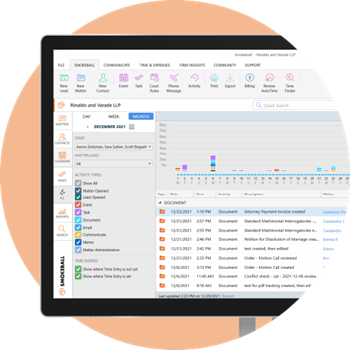Sponsored Content
Making the Case for Using Law Practice Management Software in Your Firm
August 18, 2023
 In today's fast-paced legal landscape, law firms are under immense pressure to deliver high-quality legal services efficiently and effectively. Managing multiple cases, clients, deadlines, and documents can be overwhelming and time-consuming, leading to burnout, errors, and missed opportunities. This is where law practice management software matters.
In today's fast-paced legal landscape, law firms are under immense pressure to deliver high-quality legal services efficiently and effectively. Managing multiple cases, clients, deadlines, and documents can be overwhelming and time-consuming, leading to burnout, errors, and missed opportunities. This is where law practice management software matters.
By automating and centralizing many of the administrative tasks involved in legal practice, law practice management software (also known as case management software) can help law firms of all sizes streamline their workflows, reduce costs, and improve client satisfaction.
Smokeball's expertise as an award-winning legal practice management software provider can help you explore the right legal software for your firm. Whether you’re a solo practitioner or part of a large law firm, this guide can help you take your legal practice to the next level.
What Is Legal Practice Management Software?
Legal practice management software is a type of software designed specifically for law firms and legal professionals to manage their day-to-day tasks and operations. It offers a range of tools and features to automate many of the administrative tasks involved in legal practice, including time tracking and billing, document management, lead management/intake, calendaring, and more.
With the help of this technology, attorneys can spend more time focusing on the legal work that matters while leaving administrative tasks to the software.
Law firms that do not use practice management software face several challenges that can impact their efficiency, productivity, and overall success. Here are some of the main issues:
-
Time-consuming administrative tasks. Without practice management software, law firms would likely manage their cases, clients, schedules, and documents manually, which can be incredibly time-consuming and lead to errors.
- Lack of organization. Manual document management can also result in a lack of organization, which can make it difficult to find important documents, track deadlines, and stay on top of client communication.
- Inefficient workflows. Without the ability to automate and streamline workflows, law firms may have inefficient processes that are prone to bottlenecks and delays, leading to missed deadlines and dissatisfied clients.
- Limited collaboration. When team members are not able to access the same information and tools in real time, collaboration and communication may suffer, leading to confusion and errors.
- Inconsistent billing. Without a centralized billing system, law firms may struggle to accurately bill clients for their time and expenses, leading to financial losses and client dissatisfaction.
Why Your Law Firm Needs Practice Management Software
Overall, law practice management software offers numerous benefits to law firms of all sizes. By streamlining workflows and automating processes, law firms can become more profitable and gain a competitive edge in the legal marketplace through the following:
- Increased efficiency and productivity. Law practice management software streamlines administrative tasks, helping legal professionals to focus more on legal work. With automated workflows and centralized client information, law firms can increase their efficiency and productivity, enabling them to handle more cases and clients in less time.
- Improved organization. Law firms can organize all of their cases, clients, and documents in a centralized location. Plus, document automation tools allow law firms to enter client details once and automatically apply them to every form and document they need. This reduces the risk of misplacing or incorrectly copying and pasting important information and helps to ensure that team members can easily find what they need when needed.
- Enhanced collaboration and communication. Law practice management software often features a client portal, which allows lawyers and clients to collaborate on cases and communicate more efficiently. It can also facilitate real-time updates and notifications to keep everyone on the same page.
- Better client service. Using law practice management software may mean faster response times, improved communication, reduced human error, and the ability to share documents and information securely.
- Increased profitability. Law firms can increase their profitability by reducing labor costs and maximizing billable hours. Plus, legal reporting insights can help firm leaders make important decisions about which areas of the business cost the most money and where improvements can be made.
- Improved billing and invoicing. With practice management software, law firms may track their time and expenses more easily and generate invoices for clients with greater accuracy. This ca
n help prevent billing errors and disputes and help ensure that the firm is paid promptly and fairly.
When choosing law practice management software, it's important to consider factors such as core functional requirements, cloud-based versus standalone software, ease of usability, cost implications, and integration with other tools. If you want to run a more efficient and profitable firm, then utilizing legal technology is critical to your success.
Jordan Turk (pictured) is an attorney and legal technology advisor at Smokeball, a leading cloud-based legal practice management software.
D.C. Bar members are eligible for a 10 percent discount on new Smokeball subscriptions.


